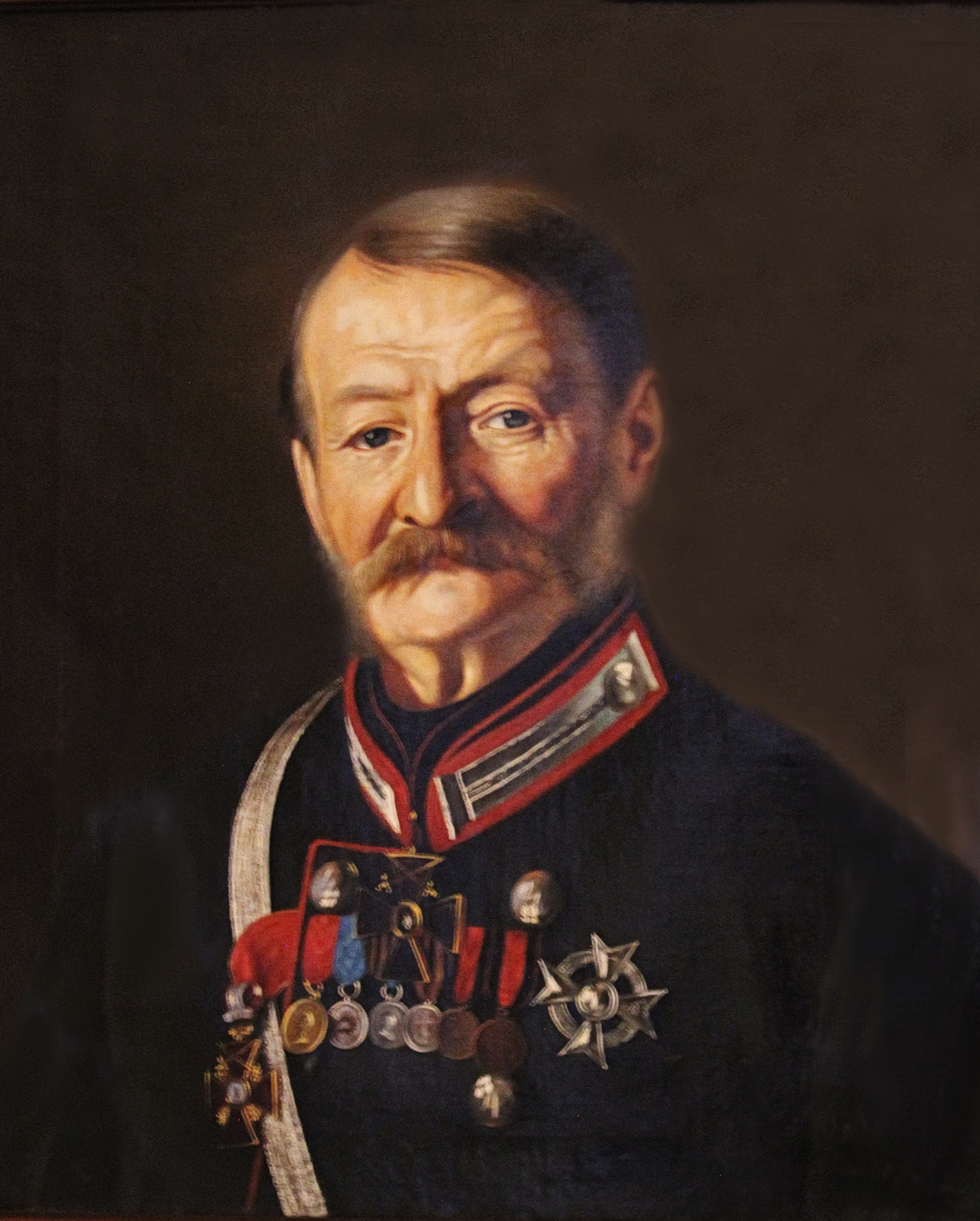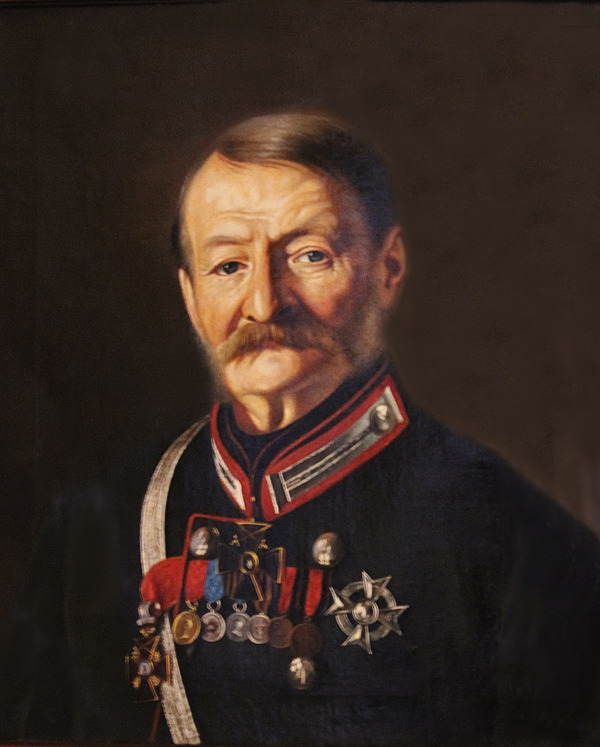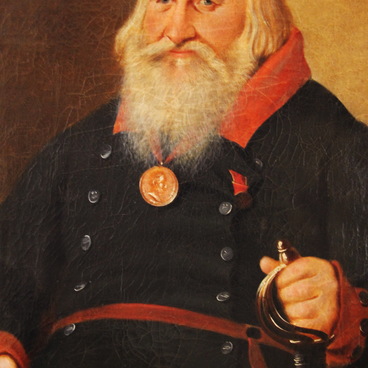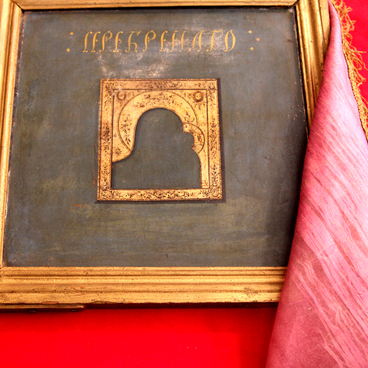Fedor Shchukin, whose portrait was painted by an unknown master, was marshal of Kaluga nobility and a well-known governorate figure.
The Shchukin family were descendants of a Polish nobleman Yakov Shchuka who came to Russia from Poland in the second half of the XVII century. His son Anisim was granted an estate for outstanding service, and his descendants served the Russian crown in different ranks for many generations.
Fedor Shchukin, an aristocrat of Borovsk county in Kaluga region, received home education. In 1808, he was accepted to the Moscow archive of the State Collegium of Foreign Affairs as a registrar. Shchukin took part in the Patriotic War of 1812 and in foreign campaigns of 1813-1814 in the rank of warrant officer of Moscow militia. He was also a participant of the Russian-Turkish war of 1828-1829.
Shchukin received multiple awards for his service, including the Order of Saint Vladimir of the 4th grade with swords and the Order of Saint Anna of the 2-nd grade ‘For Valor’. On July 14 1832, Shchukin was invalided out of the army. He finished his military career in the rank of lieutenant colonel with a dress coat and pension comprising one-third of his salary. Shchukin was elected marshal of nobility of Borovsk county and in 1857 he became marshal of nobility of the Kaluga Governorate. Performing this honorable duty he established himself as a tireless, strictly truthful and extremely selfless person.
During the preparation of the peasant reform of 1861, Fedor Shchukin served as the chairman of the Committee of Governorate Nobility On Improving the Conditions of Life of Landlords’ Peasants. Shchukin was an active Committee member assisting peasants and received an award for his service.
The marshal of Kaluga nobility was friends with exiled Decembrists living in Kaluga and with imam of Dagestan and Chechnya Shamil who took an oath of allegiance to the Russian Tsar on August 28, 1866.
Shamil once said: “His Majesty grants such great favors to me that can be given only to a beloved son or to a person who did a lot of good and was helpful to his country … Each favor from His Majesty cuts into my heart as the sharpest knife when I remember how much harm I caused to His Majesty and his Russia and how he now punishes me for that, I am so ashamed I cannot look into your face and I am ready to bury myself in the ground!” Shchukin replied to that: “Don”t be so disturbed by your former actions, His Majesty grants his favors to you as he usually does and not because he wants to punish you for that but because he never does otherwise”.
The imam always received a warm welcome in Shchukin’s house. Shchukin managed to get Shamil to like Kaluga and its citizens and they warmed up to the influential imam. Later one of Shamil’s sons served for a while together with Fedor Semenovich’s son – Nikolai Shchukin.
The Shchukin family were descendants of a Polish nobleman Yakov Shchuka who came to Russia from Poland in the second half of the XVII century. His son Anisim was granted an estate for outstanding service, and his descendants served the Russian crown in different ranks for many generations.
Fedor Shchukin, an aristocrat of Borovsk county in Kaluga region, received home education. In 1808, he was accepted to the Moscow archive of the State Collegium of Foreign Affairs as a registrar. Shchukin took part in the Patriotic War of 1812 and in foreign campaigns of 1813-1814 in the rank of warrant officer of Moscow militia. He was also a participant of the Russian-Turkish war of 1828-1829.
Shchukin received multiple awards for his service, including the Order of Saint Vladimir of the 4th grade with swords and the Order of Saint Anna of the 2-nd grade ‘For Valor’. On July 14 1832, Shchukin was invalided out of the army. He finished his military career in the rank of lieutenant colonel with a dress coat and pension comprising one-third of his salary. Shchukin was elected marshal of nobility of Borovsk county and in 1857 he became marshal of nobility of the Kaluga Governorate. Performing this honorable duty he established himself as a tireless, strictly truthful and extremely selfless person.
During the preparation of the peasant reform of 1861, Fedor Shchukin served as the chairman of the Committee of Governorate Nobility On Improving the Conditions of Life of Landlords’ Peasants. Shchukin was an active Committee member assisting peasants and received an award for his service.
The marshal of Kaluga nobility was friends with exiled Decembrists living in Kaluga and with imam of Dagestan and Chechnya Shamil who took an oath of allegiance to the Russian Tsar on August 28, 1866.
Shamil once said: “His Majesty grants such great favors to me that can be given only to a beloved son or to a person who did a lot of good and was helpful to his country … Each favor from His Majesty cuts into my heart as the sharpest knife when I remember how much harm I caused to His Majesty and his Russia and how he now punishes me for that, I am so ashamed I cannot look into your face and I am ready to bury myself in the ground!” Shchukin replied to that: “Don”t be so disturbed by your former actions, His Majesty grants his favors to you as he usually does and not because he wants to punish you for that but because he never does otherwise”.
The imam always received a warm welcome in Shchukin’s house. Shchukin managed to get Shamil to like Kaluga and its citizens and they warmed up to the influential imam. Later one of Shamil’s sons served for a while together with Fedor Semenovich’s son – Nikolai Shchukin.



